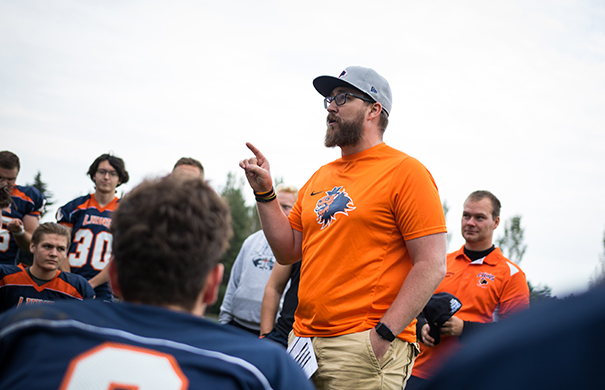
Ministry Updates
How American Football is Winning European Souls
October 31, 2017
by Heidi Chupp

On a damp and wintry afternoon in Prague, Czech Republic, TEAM missionary Zach Harrod was running down the street — not for exercise, not to escape danger, but simply to go from one meeting to another.
He and his wife, Míša, had just spent time with friends who were part of their support team. And now Zach had to hurry to his next meeting — football practice. The rest of the afternoon, Zach coached, recruited, hauled equipment between locations and led conditioning workouts and practices.
Zach and Míša live with this interesting mix of ministry every day — helping plant churches in Prague and living out their faith in the American-style football community of the Czech Republic.
Zach’s journey into sports ministry began with high school football and continued into college, where he lettered all four years. When he became a follower of Jesus, a desire for ministry grew in his heart.
He served with Athletes in Action in the Czech Republic before transitioning to TEAM, where he began to invest more time in church planting while continuing his involvement in sports ministry.
Winning Games … and Souls
So what does sports ministry look like in real life?
Sports ministry looks like sports. It’s focused and competitive. It’s training camps and conditioning. It’s an all-out effort to perform at the highest possible level and win.
The Prague Lions have won numerous league championships under Zach’s coaching and mentorship. However, they’ve also faced defeat.
One year, they lost the championship in the last two seconds, the result of a questionable call by one official. “It was awful,” Zach said. He cried on Míša’s shoulder afterward.
“We worked so hard to get there,” he remembered.
Sports ministry means investing in players and coaches to develop their talents. Zach regularly sends a few coaches to a series of sports clinics at U.S. universities. He also coordinates opportunities for players to travel to the States for football camps.
Football could be considered a distraction from ministry. But for Zach, it is the ministry.
It’s laid a foundation of trust and credibility. He’s discovered opportunities for real conversations, for long-lasting and meaningful friendships.
Where God Does the Most Work

Cultivating relationships with the team on and off the field is crucial for not only team success but also for creating space to share the Gospel. Photo courtesy of Jakub Pláteník
Sports ministry also looks like ministry. It’s what fuels Zach’s efforts and what drives his investment of time and energy. It has a higher aim than whatever shape each day takes. It’s focused, as he says, on “deep, everlasting change.”
So when opportunities come up to share the Good News, he speaks. He’s deliberate in building long-term relationships, in caring for people, in living out his faith. He organizes a team meal every year for the sole purpose of telling his players in a practical way that he loves them.
“It’s really just being able to be a normal person,” he says. “Letting people into our junk and our mess — that’s where God does the most work.”
Zach remembers instances when he’s lost his temper after a player’s poor performance on the field. His ready apology, something traditionally viewed as a sign of weakness in Czech culture, has made a huge impact on the team.
An Insider … and an Outsider
Sometimes, just being a “normal person” is both relevant to the community and at the same time challenging to societal norms, even counter-cultural. Zach feels like an insider and an outsider all at the same time.
Having lived in the country for more than a decade now, he considers the Czech Republic home — especially since he has a Czech wife — but he knows he will always be viewed as an American.
He’s fluent in Czech and has a deep understanding of the culture, but he sees himself as a perpetual student.
Zach has deliberately framed his team values within a traditional Czech cultural context. And the Prague Lions have been praised by the national media for their character and sportsmanship on the field. But his coaching style — focused on the positive and one building character and leadership — is vastly different than the approach usually taken by Czech coaches (who often treat their players harshly).
Zach’s involvement with the American football community in the Czech Republic gives him connections and access to a group of people that he wouldn’t have otherwise. But he’s also an unashamed Christian in a nation that’s one of the most atheistic and spiritually indifferent in the world.
So, unless God directs otherwise, Zach plans to keep on running toward sports ministry. It’s a life he knows the Lord custom designed for him, and he has seen the value and the fruit in pursuing what he’s been gifted to do.
“It might not be how everyone else’s life looks, but that’s OK,” Zach says. “It’s gonna be what God intended for me, and it’s gonna be an adventure.”
Does the idea of pairing your hobbies and talents with missions excite you? If so, talk to a TEAM missions coach today!
Related articles



